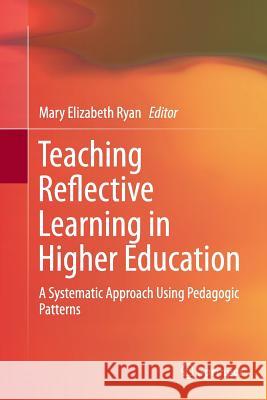Teaching Reflective Learning in Higher Education: A Systematic Approach Using Pedagogic Patterns » książka
Teaching Reflective Learning in Higher Education: A Systematic Approach Using Pedagogic Patterns
ISBN-13: 9783319344409 / Angielski / Miękka / 2016 / 234 str.
This book is about understanding the nature and application of reflection in higher education. It provides a theoretical model to guide the implementation of reflective learning and reflective practice across multiple disciplines and international contexts in higher education. The book presents research into the ways in which reflection is both considered and implemented in different ways across different professional disciplines, while maintaining a common purpose to transform and improve learning and/or practice. The Readers will find this book is innovative and new in three key ways. Firstly, in its holistic theorisation of reflection within the pedagogic field of higher education; Secondly, in conceptualising reflection in different modes to achieve specific purposes in different disciplines; and finally, in providing conceptual guidance for embedding reflective learning and reflective practice in a systematic way across whole programmes, faculties or institutions in higher education. The book considers important contextual factors that influence the teaching of forms and methods of reflection. It provides a functional analysis of multiple modes of reflection, including written, oral, visual, auditory, and embodied forms. Empirical chapters analyse the application of these modes across disciplines and at different stages of a programme. The theoretical model accounts for students' stage of development in the disciplinary field, along with progressive and cyclical levels of higher order thinking, and learning and professional practice that are expected within different disciplines and professional fields. Secondly, in conceptualising reflection in different modes to achieve specific purposes in different disciplines. It provides a functional analysis of multiple modes of reflection, including written, oral, visual, auditory, and embodied forms. Empirical chapters analyse the application of these modes across disciplines and at different stages of a programme in terms of demonstrating levels of reflection. The book includes images, diagrams and different text forms to support the creative applications of reflection. And thirdly, the book is innovative in providing conceptual guidance for embedding reflective learning and reflective practice systematically across whole programmes, faculties or institutions in higher education contexts across the world.











